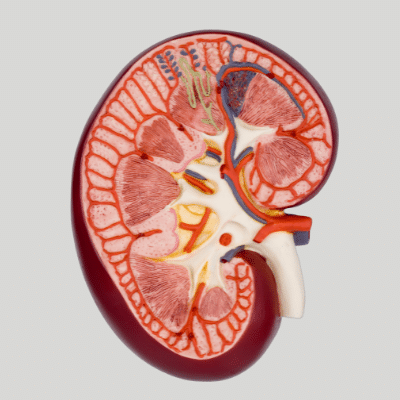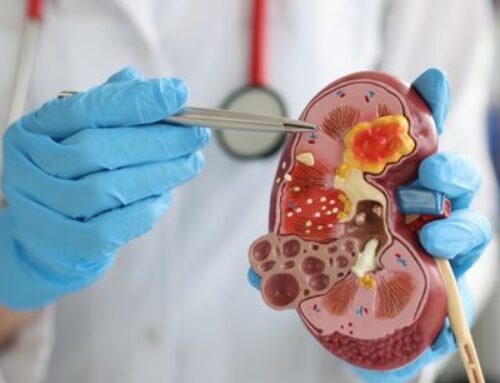Nephrology is a subspecialty of internal medicine that focuses on the kidneys and the acute and chronic conditions that affect them. Nephrologists study their specialty for two additional years beyond their residency.
 The Science of Nephrology
The Science of Nephrology
Nephrology studies the anatomy and physiology of the kidneys. The kidneys’ primary function is to filter waste from the blood and release the byproducts into the urine. Kidneys also reabsorb nutrients from the blood and transport them to where they are needed in the body. When the kidneys are functioning correctly, they also help regulate blood pressure.
Diseases and Conditions Affecting the Kidneys
Nephrologists treat several diseases and conditions that can affect the kidneys. These include:
Diabetes Nephropathy
People with diabetes can suffer damage to their kidneys from the high glucose levels their diabetes leaves them with. Over time, this damages the kidney’s filtering system so that protein escapes into the bloodstream. When diabetes nephropathy is allowed to progress, it can ultimately lead to kidney failure.
Kidney Stones
Kidney stones are hard deposits of minerals and salts that can form inside the kidneys. They are usually a result of the presence of an excess of certain mineral deposits. There are four distinct types of kidney stones:
- Calcium stones
- Struvite stones
- Uric acid stones
- Cystine stones
Kidney Infections
Kidney infections are usually due to a urinary tract infection that spreads to the kidneys. When the infection reaches the kidneys, it usually presents worse symptoms than the initial urinary tract infection. If these infections go untreated, they can become septic.
Kidney Tumors
Kidney tumors can be either benign or malignant. Most of the time, these tumors do not cause symptoms until they are discovered through other tests. There are three types of kidney cancer:
- Renal cell cancer
- Transitional cell cancer
- Wilms tumor
Kidney Hydronephrosis
Kidney hydronephrosis is a swelling in the kidneys due to a urine buildup. It is usually due to an obstruction preventing the kidney from draining properly.
Interstitial Nephritis
Interstitial nephritis is a condition where inflammation and swelling occur between the tubules inside the kidney.
Nephrotic Syndrome
Nephrotic syndrome is a condition where your kidneys allow too much protein to pass through them. It is usually the result of damage to small blood vessels inside the kidney.
Kidney Failure
The most common conditions that nephrologists treat are kidney failure. Kidney failure can either be acute or chronic.
Acute kidney failure is the sudden inability of the kidneys to filter waste products. It can result from kidney injury and usually presents suddenly when one is hospitalized for another condition. If caught in time, acute kidney failure can be reversed. However, it is frequently a fatal condition. Symptoms of acute kidney failure include:
- Decreased urine output
- Swelling in legs, feet, and ankles
- Shortness of breath
- Fatigue
- Mental confusion
- Nausea
- Weakness
- Irregular heartbeat
- Chest pain
- Seizures
Chronic kidney disease is a gradual loss of kidney function that can take place over months or years. This condition is not usually caught in the early stages. Symptoms include:
- Nausea and vomiting
- Loss of appetite
- Fatigue and weakness
- Sleep problems
- Changes in the quantity of urine output
- Muscle cramps
- Swelling in feet and ankles
- Constant itching
- Chest pain
- Shortness of breath
- Hypertension
Kidney Dialysis
When the kidneys are failing due to acute failure or in the end stages of chronic kidney disease, kidney dialysis becomes an important option. Dialysis involves the cleansing of the blood of the waste the kidneys are no longer capable of filtering out. There are two types of kidney dialysis:
Hemodialysis
With hemodialysis, your blood is drained, through a catheter in your arm, into a machine known as a hemodialyzer. This machine will filter waste and other chemicals and fluids from your blood. A hemodialysis session will usually last several hours, and depending on the level of function, can take place a few times a week.
Peritoneal Dialysis
There are two main types of peritoneal dialysis.
Continuous Ambulatory Peritoneal Dialysis (CAPD)
With Continuous Ambulatory Peritoneal Dialysis, you will have a catheter placed in your abdomen. You will not need a machine for this type of dialysis. Approximately four times a day, you will put the contents of a bag of dialysate through your catheter. The contents remain there for four to five hours before you drain the fluids back into the bag and dispose of the bag. This is known as an exchange. While the dialysate does its work, you can work and go about your day like normal.
Automated Peritoneal Dialysis (APD)
With Automated Peritoneal dialysis, you will have a machine at home known as a cycler. You connect to your catheter at bedtime, and the cycler will do the exchange while you sleep. Each cycle lasts approximately 90 minutes, and you will go through several cycles every night.
Transplant
When there is no kidney function left, and dialysis is no longer an option, you will be put on a transplant list. Once you receive your transplant, your doctor will handle your medication and post-operative maintenance. Transplant is the last resort, but it is also the best option for people with complete kidney failure.
If you are suffering from pain you think is associated with kidney stones, Richmond Nephrology Associates can help. If you have chronic issues with kidney stones, call us today.

 The Science of Nephrology
The Science of Nephrology


